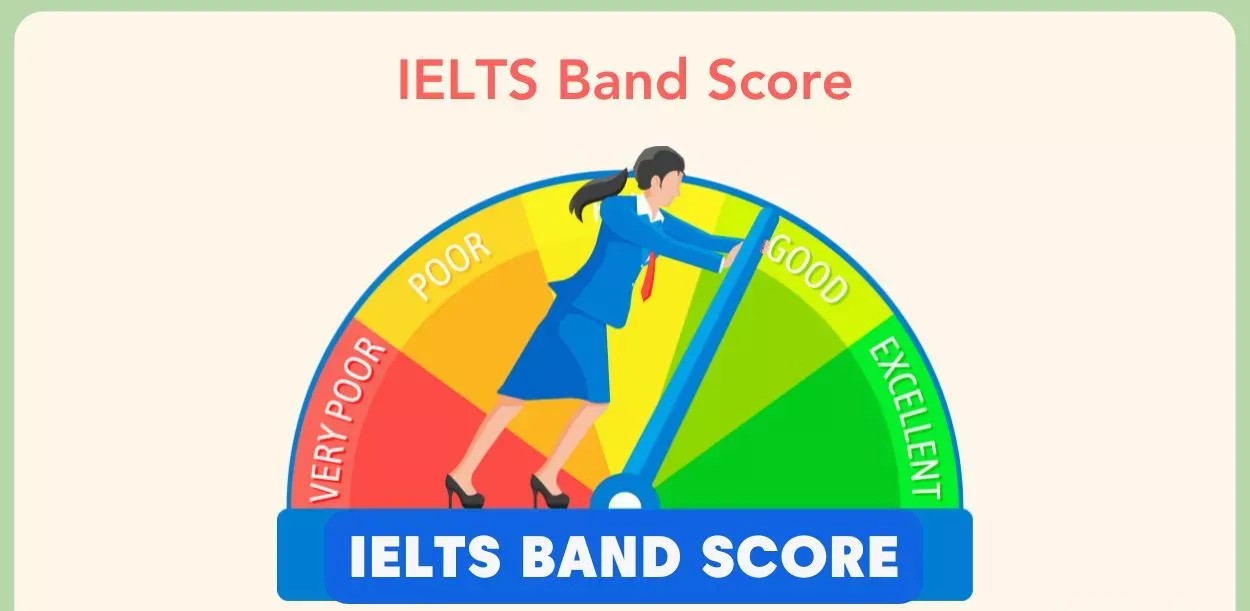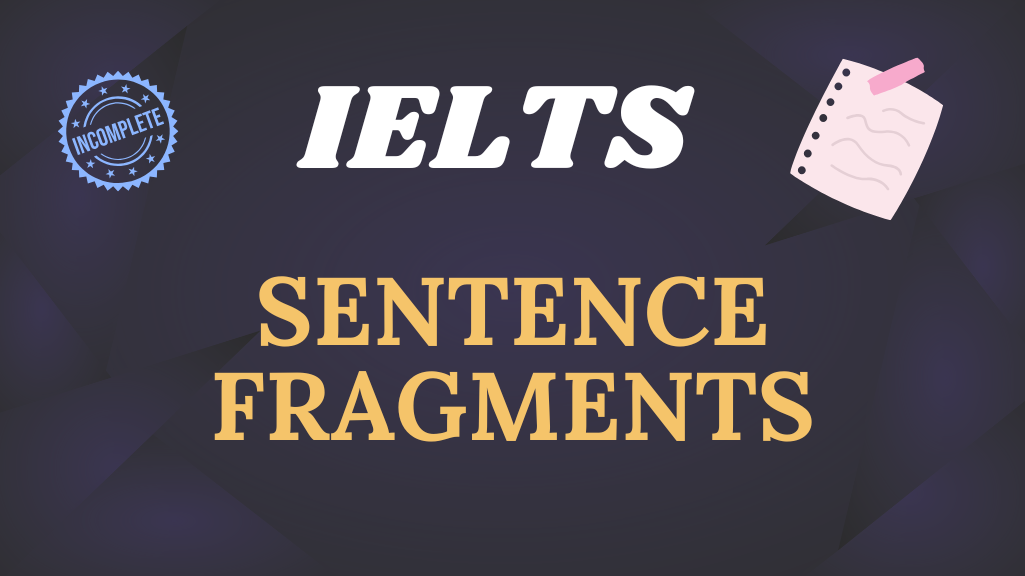What Are Sentence Fragments?
Have you ever read a sentence and felt like something was missing? That’s probably a sentence fragment! A sentence fragment is an incomplete sentence that lacks a subject, a verb, or a complete thought. These fragments sneak into your writing, making it seem unpolished and hard to follow. If you're aiming for a high band score in IELTS, avoiding sentence fragments is a must!
To put it simply, a sentence fragment is a group of words that looks like a sentence but isn’t actually complete. For example:
❌ Because she was hungry.
This is a sentence fragment because it doesn’t form a complete thought. It leaves the reader wondering, What happened because she was hungry?
Now, compare it with these correct versions:
✅ She ate five cookies because she was hungry.
✅ Because she was hungry, she ate five cookies.
Both sentences are complete because they express a full thought and have both a subject and a verb.
What Makes a Complete Sentence?
For a sentence to be grammatically correct, it must have three essential elements:
1. A subject – Who or what the sentence is about.
2. A verb – The action or state of being.
3. A complete thought – The sentence should make sense on its own.
.png)
Examples:
-> Although the weather was cold. (Fragment – what happened?)
✅ Although the weather was cold, they decided to go hiking. (Complete sentence)
-> Studying for the IELTS exam. (Fragment – no subject or verb)
✅ She is studying for the IELTS exam. (Complete sentence with subject + verb)
-> The graph showing an increase in sales. (Fragment – missing verb)
✅ The graph shows an increase in sales. (Now it has a verb and is a full sentence)

Why Sentence Fragments Hurt Your IELTS Score
Sentence fragments are considered a major grammatical error in IELTS Writing. If your essay contains fragments, it can lower your band score significantly, especially in these areas:
- Grammatical Range & Accuracy (25%)
- IELTS examiners check for proper sentence structure and grammar variety.
- Frequent sentence fragments show weak grammar skills and may result in a Band 5 or lower.
- Coherence & Cohesion (25%)
- Your essay should be logically structured and easy to follow.
- Sentence fragments disrupt the flow of ideas, making your writing seem disjointed and unclear.
- Lexical Resource & Task Achievement
- Good vocabulary and strong ideas don’t matter if your sentences are grammatically incorrect.
- Sentence fragments can confuse the examiner and make your arguments weaker.
Examples:
❌ Although climate change is a serious issue. Many governments are taking action. Trying to reduce carbon emissions.
Problem: The second part (Trying to reduce carbon emissions) is a fragment because it lacks a subject.
✅ Corrected Version: Although climate change is a serious issue, many governments are taking action by trying to reduce carbon emissions.
Now, the sentence is grammatically correct, logical, and connected.
Common Causes of Sentence Fragments
1. Dependent Clauses as Sentences
A dependent clause cannot stand alone because it does not express a complete thought. It needs an independent clause to form a complete sentence.
Theory: A sentence requires at least one independent clause (a subject and a predicate) to convey a full idea.
Example:
❌ Although pollution is a serious problem.
✅ Although pollution is a serious problem, many measures can be taken to reduce it.
2. Missing a Subject
Every sentence needs a subject to indicate who or what is performing the action or is in a certain state.
Theory: The subject is the "doer" of the action or the main topic being described. Without it, the sentence lacks clarity.
Example:
❌ Became sick after walking in the cold rain.
✅ She became sick after walking in the cold rain.
3. Missing a Verb
A sentence without a verb is incomplete because it lacks the action or state of being.
Theory: A verb is essential to express what the subject is doing or the state they are in. A sentence cannot function properly without it.
Example:
❌ The IELTS test with high difficulty.
✅ The IELTS test has a high difficulty level.

4. Non-Finite Verbs
Non-finite verbs (like gerunds, participles, or infinitives) cannot function as the main verb of a sentence. They require a finite verb to form a complete thought.
Theory: Non-finite verbs describe actions but don’t indicate tense, so they need a finite verb to provide temporal context and completion to the sentence.
Example:
❌ Running away from my mother.
✅ He was running away from his mother.
5. Coordinating Conjunctions Without a Complete Clause
Coordinating conjunctions (FANBOYS: For, And, Nor, But, Or, Yet, So) must connect two independent clauses. Without a full clause following a coordinating conjunction, the result is a fragment.
Theory: Conjunctions link related ideas. For proper connection, they must connect two complete clauses that both contain a subject and a verb.
Example:
❌ And went to the store for groceries.
✅ She went to the store for groceries.
6. Misuse of Relative Pronouns
Relative pronouns (who, which, that, etc.) introduce clauses that provide additional information. These relative clauses must be part of a larger independent clause.
Theory: A relative clause cannot stand alone. It relies on the independent clause to give the sentence context and clarity.
Example:
❌ Which was the best solution to the problem.
✅ The strategy, which was the best solution to the problem, helped the company recover.

7. Punctuation Mistakes Creating Fragments
Incorrect punctuation, such as placing a period in the middle of a sentence, can break it into fragments.
Theory: Proper punctuation is crucial in ensuring that sentences flow and connect logically. A sentence should not be prematurely separated by periods unless it’s a complete thought.
Example:
❌ The researchers gathered all the data. Before making their final conclusions.
✅ The researchers gathered all the data before making their final conclusions.
8. Sentences That Start with "Such as" or "For Example"
When using "such as" or "for example," it’s important that the sentence that follows completes the idea and doesn’t leave it hanging.
Theory: Both "such as" and "for example" introduce examples or specific details, and they require a complete sentence to explain what these examples relate to.
Example:
❌ For example, different types of pollution.
✅ For example, different types of pollution affect human health in various ways.
Fixing Sentence Fragments – Practical Examples
Let's look at some real examples and their fixes:
Example 1 (Fragment Issue: Missing Subject)
❌ Ivana appeared at the committee meeting last week. And made a convincing presentation of her ideas about the new product.
✅ Ivana appeared at the committee meeting last week and made a convincing presentation of her ideas about the new product.
Example 2 (Fragment Issue: Missing Verb)
❌ The committee considered her ideas for a new marketing strategy quite powerful. The best ideas that they had heard in years.
✅ The committee considered her ideas for a new marketing strategy quite powerful; they were the best ideas that they had heard in years.
Example 3 (Fragment Issue: Dependent Clause Standing Alone)
❌ She spent a full month evaluating his computer-based instructional materials. Which she eventually sent to her supervisor with the strongest of recommendations.
✅ She spent a full month evaluating his computer-based instructional materials. Eventually, she sent the evaluation to her supervisor with the strongest of recommendations.
Practice
Questions:
- Although he studied hard for the exam.
- Ran quickly to the store for some groceries.
- The team’s proposal for the new product.
- Planning to start a new business.
- But finished his work early.
- That helped her improve her skills.
- He worked overtime to meet the deadline. After several weeks of preparation.
- For example, the different types of learning strategies.
- John was late to the meeting. Because his car broke down.
Answers:
- Although he studied hard for the exam, he didn't pass it.
- She ran quickly to the store for some groceries.
- The team’s proposal for the new product was well received.
- He is planning to start a new business.
- He finished his work early, but he stayed late to help his colleagues.
- The training program that helped her improve her skills was intensive.
- He worked overtime to meet the deadline after several weeks of preparation.
- For example, the different types of learning strategies include visual, auditory, and kinesthetic methods.
- John was late to the meeting because his car broke down.
